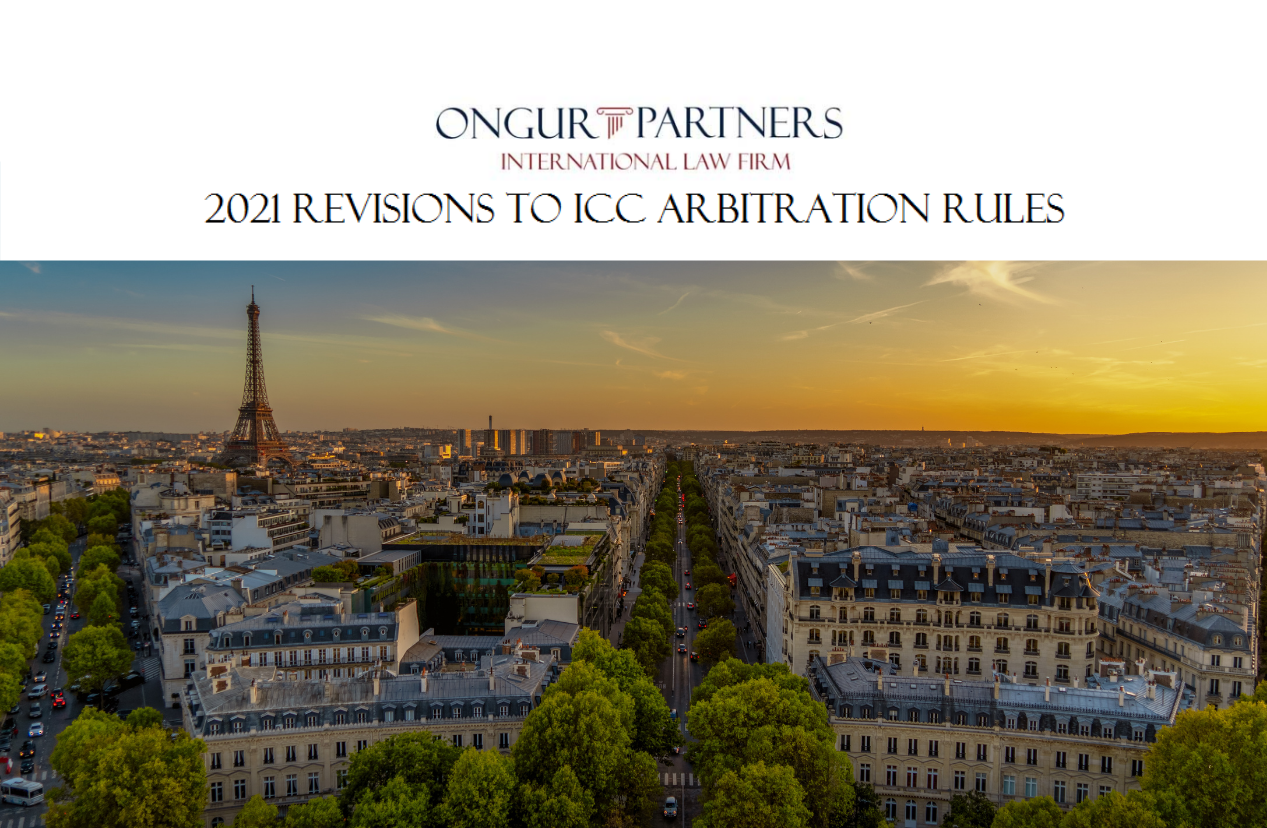- 1 Introduction
- 2 New Threshold for Expedited Arbitration
- 3 Arbitral Tribunal’s Revised Role in the Settlement of Disputes
- 4 New Rules relating to Multi-Party Arbitrations
- 5 Appointment of Arbitrators by the Court
- 6 New Rules Aimed at Avoiding Conflicts of Interest
- 7 Increased Use of Technology
- 8 New Rules concerning Investor-State Disputes
- 9 Conclusion
Introduction
New ICC Arbitration Rules entered into force on 1 January 2021[1] with the aim of increasing the efficiency, flexibility and transparency of ICC arbitrations. In a nutshell, the new provisions in the revised rules give more flexibility and authority to the arbitral tribunals to decide on procedural matters and endorse an increased use of technology. Below is a brief overview of some of the noteworthy revisions and changes made to the 2021 Rules.
New Threshold for Expedited Arbitration
According to Appendix VI Art. 1(2) to the new ICC Rules, the new limit for fast-track arbitration has been raised to USD 3 million as opposed to the previous USD 2 million. This provision is applied if the arbitration agreement is entered into following the entering into force of the new Rules on 1.1.2021. The parties to the arbitration can opt-out from the automatic application of the expedited procedure, whereas the disputes with a value over the threshold may also be adjudicated under this procedure if the parties opt-in.
Arbitral Tribunal’s Revised Role in the Settlement of Disputes
Paragraph (h)(i) to Appendix IV has been revised to the effect that it now empowers the arbitral tribunal to “encourage” the parties to consider settlement, instead of merely “informing” them of such possibility. Accordingly, the arbitrators are now under a duty of encouraging the parties to settle all or part of their dispute by negotiation or through any form of amicable dispute resolution methods, such as ICC Mediation Rules.
New Rules relating to Multi-Party Arbitrations
Joinder of Additional Parties
The new paragraph 5 added to Article 7 provides discretion to the arbitral tribunal to grant a request for joinder by an additional party submitted after the constitution of the arbitral tribunal, whereas previously consent of all existing parties was required. Under the new rules, joinder of an additional party to a pending arbitration is possible, provided that such party consents to the jurisdiction of the arbitral tribunal and the Terms of Reference.
It is also provided under this new provision that when exercising this discretion, the arbitral tribunal must consider all relevant circumstances, including the timing of this request, whether it has prima facie jurisdiction over the additional party, the impact of the joinder on the procedure and potential conflicts of interest.
Consolidation of Pending Cases
New Article 10 (b) expressly allows the consolidation of two or more pending ICC arbitration cases as below:
(i) where all the claims are made under the same arbitration agreement, the cases may be consolidated even if different parties are involved;
(ii) where the parties are the same and the disputes concern the same legal relationship, the cases may be consolidated even if the arbitration agreements are different, provided that these are compatible.
Both provisions that make joinder and consolidation easier in an ICC arbitration arguably increase the efficiency of the process as they reduce the risk of conflicting awards rendered in parallel proceedings. On the other hand, making joinder of an additional party and consolidation of cases easier can also render the arbitration more complex, lengthy and costly. For this reason, it is important for parties in multi-contractual relationships to consider beforehand whether joinder or consolidation is desirable for their relationship and be mindful of whether the arbitration agreements in different interrelated contracts are compatible.
Appointment of Arbitrators by the Court
Article 12(9) of the new Rules is probably the one that gives rise to most debate. The provision reads:
“Notwithstanding any agreement by the parties on the method of constitution of the arbitral tribunal, in exceptional circumstances the Court may appoint each member of the arbitral tribunal to avoid a significant risk of unequal treatment and unfairness that may affect the validity of the award.”
This provision is further clarified by the ICC in its Note to Parties and Arbitral Tribunals on the Conduct of the Arbitration under the ICC Rules of Arbitration[2] that it may apply in exceptional circumstances, e.g. when the arbitration agreement provides for one party to constitute the arbitral tribunal unilaterally, and such unilateral right is not admitted by the law at the seat of the arbitration.
While this provision constitutes a restriction on the right of a party to appoint its own arbitrator, it may be justified in the event of unconscionable arbitration agreements to ensure compliance with due process, given that the equality of the parties in an arbitration is a matter of public policy that must be taken into account by the national courts.
New Rules Aimed at Avoiding Conflicts of Interest
Possible Exclusion of Newly Appointed Party Counsel
Article 17(1) requires each party to promptly disclose any changes in counsel, and 17(2) allows the tribunal to exclude party counsel from participating in the arbitral proceedings to prevent conflicts of interest that may arise from such change. In particular, the new provision empowers the arbitral tribunal to take “any measure necessary” after consulting with the parties when a change in party representation after the constitution of the arbitral tribunal risks the emergence of a conflict of interest. Similar rules and guidelines can be found in the LCIA Arbitration Rules, as well as IBA … Party Representation.
While this provision may not be compatible with the principle of party autonomy, and in particular parties’ freedom to choose their representatives, exclusion of a party’s representative may nevertheless be appropriate in cases of dilatory tactics when a newly appointed party counsel might raise doubts as to an arbitrator’s independence and impartiality.
Disclosure of the Existence and Identity of Third Party Funders
In addition, Article 11(7) now requires the parties to disclose both the existence and identity of third party funding. This provision will have implications on the arbitrators’ duties of disclosure, as they will need to disclose any relationships with any entity that have a direct economic interest in the outcome of the arbitration.[3]
Increased Use of Technology
Online Hearings
Article 26(1) now empowers the arbitral tribunal to conduct hearings virtually, after consulting with the parties. In addition, under the revised Rules, Article 25(2), which provided for an in person hearing of the parties by the arbitral tribunal has been deleted.
Electronic submissions
Under the new Article 3(1), ICC has foregone the requirement that all submissions are sent in hard copies, by providing that all pleadings and written submissions are to be sent to the parties, arbitrators and the Secretariat.
New Rules concerning Investor-State Disputes
Finally, 2021 ICC Rules introduce specific provisions to be applied in investment treaty disputes.
Article 13(6) states that, unless all parties agree otherwise, where the arbitration is based on an arbitration agreement arising from a treaty, no arbitrator shall be of the same nationality as one of the parties, enhancing the neutrality of the arbitral tribunal. In addition, under Article 29(6), treaty based investment arbitrations are excluded from the scope of the emergency arbitrators provisions of the ICC Rules. This limitation does not extend to investor-State disputes arising from an investment contract, however, and emergency arbitration may still be available for such disputes.
Conclusion
As seen, the revised Rules entail several changes that will have an impact on how ICC arbitrations are conducted. It must however also be noted that, other than the Court’s new exceptional power to appoint the arbitral tribunal by disregarding the arbitration agreement, many of these changes essentially consolidate current ICC practice, and must therefore not come as a surprise to practitioners.
[1] ICC 2021 Arbitration Rules, https://iccwbo.org/dispute-resolution-services/arbitration/rules-of-arbitration/.
[2] International Court of Arbitration, Note to Parties and Arbitral Tribunals on the Conduct of the Arbitration under the ICC Rules of Arbitration dated 1.1.2021, para. 43, https://iccwbo.org/content/uploads/sites/3/2020/12/icc-note-to-parties-and-arbitral-tribunals-on-the-conduct-of-arbitration-english-2021.pdf (22.02.2021)
[3] ibid., para. 27.



